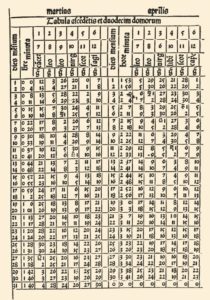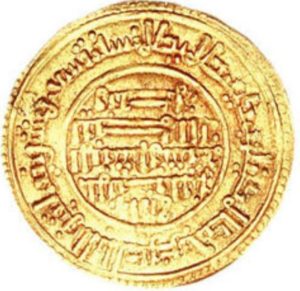The Rabbi Who Saved Columbus
Avraham ben Shmuel Zacut “Zacuto” (1452-1515) was born in Salamanca, in what is today Spain, to a religious Sephardic Jewish family. He studied both Jewish law and astronomy, becoming the rabbi of Salamanca and simultaneously an astronomy teacher. He invented a new type of astrolabe and a novel method for determining latitude at sea, which would become vital to navigators and sailors. In 1478, he published HaChibur haGadol, “The Great Book”, with detailed and easy-to-use astronomical tables. It was translated to Spanish in 1481, and Latin shortly after. This made Rabbi Zacuto world-famous and when the Jews of Spain were banished in 1492, he was immediately hired by King John II of Portugal to serve as his royal astronomer. Zacuto argued that a sea route to India was possible, and this convinced John II to finance Vasco da Gama’s famous voyage to discover the route to India, opening European sea trade with the Far East. Da Gama used Zacuto’s astrolabe and tables, and Zacuto personally trained and taught the sailors. Zacuto had also argued, based on the Zohar—the “textbook” of Jewish mysticism, dating back to Rabbi Shimon bar Yochai in the 2nd century CE—that the Earth must be spherical, and it would be possible to journey west, not east. This information was instrumental in convincing Christopher Columbus to launch his own voyage. In fact, Columbus relied heavily on Zacuto’s astrolabe and astronomical charts. In a well-known story from his third voyage, Columbus was marooned on a Caribbean island and facing both hostile natives and his own rebellious sailors. The natives refused to provide food and resources to Columbus, so he came up with a ruse. Consulting Zacuto’s tables, Columbus saw that a lunar eclipse was imminent. He told the native chief that if he will not provide resources to the sailors, the moon would go dark and God would punish them! The eclipse came and the natives panicked, giving Columbus’ men all that they needed to survive. Back in Europe, the next king of Portugal, Manuel I, followed the Spanish in expelling his Jewish subjects. Zacuto was offered to stay in Portugal if only he converted to Christianity, even just nominally. Of course, he refused, and left with his people. He first settled in Tunis, where he wrote his monumental Sefer Yuhasin, a highly-acclaimed work describing the entire history of the Jewish people. He later fulfilled his dream of making it to the Holy Land and lived his last years in Jerusalem. Rabbi Zacuto is considered one of history’s greatest and most consequential astronomers. The Zagut Crater on the moon is named after him.
Happy Lag b’Omer!
The Hidden History of Lag b’Omer
Did the Talmud Predict Today’s Crisis in Israel?
Words of the Week
The blessing in life is when you find the torture you are comfortable with. That’s marriage, it’s kids, it’s work, it’s exercise. Find the torture you’re comfortable with and you’ll do well. You’ve mastered that, you’ve mastered life.
– Jerry Seinfeld


